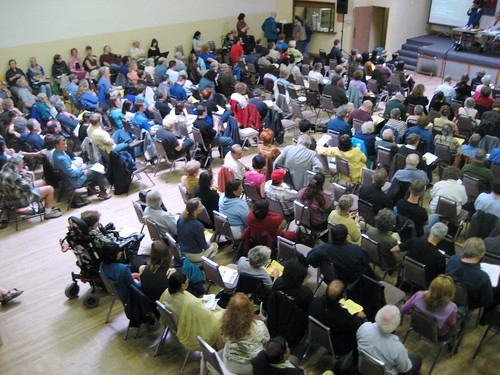Last week Sean Antrim outlined how the past three years of a Vision government has been anything but progressive. For reasons of principle and policy, he argued, COPE should not enter into another coalition with Vision. In addition to principles and policy, there are also strategic questions to consider.
What, then, are some of the strategic reasons COPE's executive has negotiated a proposal with Vision to run a joint slate in the upcoming municipal elections? There are several possible strategic reasons, all of which don't hold up under analysis.
1. At least COPE will have a "voice" on Council.
In the 2008 election, COPE and Vision made a coalition agreement. Vision ran 8 and COPE ran 2 candidates for City Council. Both of COPE's candidates won seats, and yet have wielded no decision making power on Council. Vision holds a majority of seats, and all decisions are made in private by Vision's caucus, without consulting COPE.
Although powerless in terms of voting, COPE Councillors could theoretically use their position to voice opposition. NPA Councilor Suzanne Anton has used her position to criticize from the reactionary right. But COPE has been an ineffective opposition voice. COPE often votes against Vision, but quietly. You have to follow the live audio-visual feed of Council meetings to hear about it.
COPE's role has been as "conscience" of Council. Unfortunately, COPE's alliance with Vision only makes them the fig leaf for Vision's aggressive pro-developer, anti-resident agenda. There is nothing noble in propping up that status quo.
2. If COPE and Vision run separate slates, they will split the progressive vote, allowing the NPA to come up the middle.
As discussed, Vision is not a progressive party. Although Vision ran on a progressive platform in 2008, its actions have proven otherwise. Lack of consultation has alienated community after community; pro-gentrification policies are undermining affordability; and instead of implementing the homeless action plan, Vision has resorted to evicting the homeless from shelters. Even apparently positive positions, such as Vision's pseudo-opposition to the Casino expansion, turned out to be all spin. There is no excuse for being fooled this time around.
Should COPE publicly criticize Vision's policies, and clearly distinguish itself from Vision, there is no reason it wouldn't be capable of securing the loyalty of progressive voters throughout the City, especially East Van. Criticism from the left would help properly characterize Vision as anti-progressive, forcing vote-splitting on the right, not the left.
3. Vision is identified strongly with its popular leader Gregor Robertson. It is too difficult to defeat Robertson, but after a leadership change, COPE can then run a Mayoral candidate and a slate.
Gregor Robertson's favourability ratings have continued to decline since his election. The main reason his approval rating are not even lower is precisely that COPE has not criticized Vision strongly enough (if at all) from a progressive perspective. Vancouver is a progressive city, so without criticism from the left, Robertson's approval ratings are artificially buoyed. People fear criticizing Robertson on account of his popularity, when in reality his popularity derives from a lack of progressive opposition from the people most familiar with the policies of Vision: COPE.
Suzanne Anton of the NPA has been a consistent critic of Robertson, creating the false impression that Vision is not a pro-developer, pro-corporate party (when in fact it is). The effect of this is that right-wing and centre-right voters might line up behind the horrible NPA this fall, giving hope to the NPA's Rob Ford-ist dreams.
4. COPE will get wiped out if they run a slate and a Mayoral candidate.
It is important to understand that there are very few coalition scenarios whereby COPE might wield any power on Council. Vision has shown that it will not willingly work with other parties, so COPE would have influence only if Vision won a minority of seats and COPE held a balance of power. But it should be noted that if COPE holds the balance (for example, if COPE has two seats and Vision has four), the likely outcome will not be greater power for COPE so much as a new alliance between NPA and Vision, who already vote together on all major decisions. NPA and Vision are natural allies on all major issues.
In this 'tight race' scenario, COPE is in fact more likely to be wiped-out than to win the balance of power. On the other hand, with a full slate of strong candidates, there is no telling how many seats they might win (it all depends on the strength of the candidates). This election season, Vision has recognized the power of Vancouver's only progressive party (COPE) by pre-empting their possible surge and giving them three candidates for Council. It is up to COPE's membership to now agree with Vision's analysis (but not their offer) and take the point all the way to its logical end: COPE can run independently and join the momentum of a progressive Vancouver.
There is one caveat to all this: the Vision and COPE school trustees appear to be working together well as a slate, with Vision Chair Patti Bacchus making strong stands against the Province. There may be an argument in favour of a Vision-COPE slate on the School Board.
**Photo by dooq @ Flickr**
















Joseph Jones
May 7, 2011 at 10:47 pm
Call Vision Tweedledum, call NPA Tweedledee. Then vote in the Vancouver municipal election and wonder why you bother. Oh, and call COPE Tweedleduh …